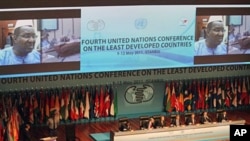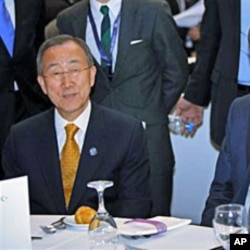"I declare open the 4th United Nations conference on the least developed countries," said Turkish President Abdullah Gul as he opened the five-day meeting.
President Gul addressed the opening session with a bleak picture, saying that despite billions of dollars in aid the global picture has failed to improve since the first meeting in Paris in 1971.
"There were 25 least developed countries in 1971. Today, number of those countries increased to 48. This situation is not sustainable," said Gul. "Although the least developed countries account for 13 percent of the world's population, they receive only one percent of the global economy's output."
Since the United Nations introduced the category of least developed countries, only Botswana, Cape Verde and Maldives have developed enough to be removed from the list. Qualification for the list includes a per-capita annual income of less than $750, and an increase to more than $900 for graduation. Other factors considered include malnutrition, child mortality and education levels.
U.N. Secretary-General Ban Ki-moon also addressed the conference and warned of dual threats of rising food and energy prices disproportionally hitting the poorest nations. He also was critical of the developed countries for their failure to honor their commitments.
"We have received a lot of very generous pledges in the past, therefore accountability will be very important. And now the United Nations will monitor the progress report as well as this delivery of their commitment," he said.
But the organizers of the conference say there are some signs that offer hope, pointing out that in recent years, many of the countries have started to record "relative high growth rates." Secretary Ban called for greater international investment, saying it is not charity, but is the chance of helping to sustain global economic growth.
The private sector has been given a more prominent role than in previous meetings. One of the main themes of the conference is focusing on building greater support among the LDC countries, in what is called south-to-south cooperation. Stress also is being put on building more ties with emerging economies.
The choice of an emerging economy to host the U.N. meeting for the first time is extremely important, according to World Bank Managing Director Ngozi Okonjo-Iweala.
"It is absolutely significant that Turkey and emerging countries host these events. The emerging markets are rising, the poorer countries are looking to them, because it was not so long ago that they themselves were struggling with poverty," Okonjo-Iweala said.
Okonjo-Iweala added that "many of the emerging markets' countries still continue to have significant numbers of poor people living in them."
"So you can see the poorer countries can relate to them. So it is very significant that one of them like Turkey offers to host a country like this because it has lot to share with the poor countries," said Okonjo-Iweala.
Turkey is paying for the conference, as well as expenses of many of those attending, all part of its growing commitment to support international development. Analysts say it is something Turkey can increasingly afford, having tripled its gross domestic product since 2001.
Last year, Ankara donated $1 billion in aid. That is less than one percent of the country's GDP, a 10-fold increase in less than a decade. In hosting the U.N. meeting, observers say Turkey wants to position itself as a bridge between the developed and least developed countries in the world.











